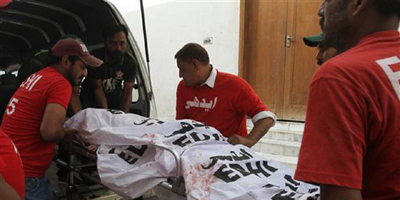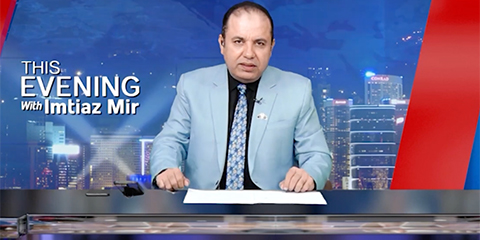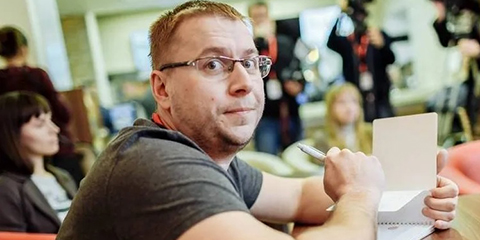
PFUJ calls for end to Impunity for Crimes Against Journalists
November 02, 2025: PFUJ urges Pakistan’s federal and provincial governments to end Impunity for Crimes Against Journalists and ensure their safety and press freedom.
JournalismPakistan.com | Published 9 years ago
Join our WhatsApp channel
BRUSSELS - In the last quarter century, at least 2,297 journalists and media staff have been killed for doing nothing more than trying to inform the world on war, revolution, crime and corruption. And killers continue to act with impunity, the International Federation of Journalists announced in a new report.
The annual total stood at 40 in the federation's first year of counting, 1990, but has not dipped under the 100-mark since 2010.
"The last ten years were the most dangerous," said IFJ General Secretary Anthony Bellanger in an interview, with 2006 the worst year of all with 155 killed.
And despite vows of protection from as high as the United Nations, the IFJ said it produced the report "25 years of contribution towards safer journalism" to underscore a worsening climate of impunity which has helped killers get away with murder and turn journalists into soft targets.
"The IFJ estimates that only one of ten killings is investigated," the report said, with actual convictions lower still.
"That is the diplomatic issue. Let's stop the impunity that protects the killers," Bellanger said.
The 79-page report will be made public next week, but The Associated Press obtained a copy ahead of a debate Monday at the British Parliament on "deaths of professional and citizen journalists in conflict zones." The IFJ will also take the report to a major UNESCO meeting in Paris next Thursday devoted to the same issue.
"We bring this report to show to all that it really is time to do something about it," said Bellanger.
Last year stood out for the attacks on the Paris office of the satirical weekly Charlie Hebdo, where two Islamic extremists killed 12 people at the satirical newspaper's office. The IFJ's total tally of the year stood at 112.
The IFJ says it bases its information on a variety of sources, including national affiliates in about 140 nations, police sources and political reports. It has published annual reports since 1990, focusing on the killings of journalists and media staff in work-related incidents. The totals center on deaths of media professionals in targeted assassinations, cross fire incidents and bomb attacks.
Beyond the sustained high totals, Bellanger said that there is also a disturbing trend in which kidnappers who seize journalists kill them, all too often without even seeking ransom.
The targeting of journalists has continued unabated this year too. Earlier this month, a suicide car bomb attack in the Afghan capital, Kabul, targeted a bus owned by Afghanistan's biggest media organization, Moby Group and a Taliban spokesman claimed responsibility saying Moby's Tolo TV was the target. Seven media workers were killed.
Over the past 25 years, Iraq has topped the list of most dangerous countries, the scene of 309 killings, the overwhelming majority of them since the 2003 U.S. led invasion and war.
In second place is the Philippines, with 146 killings, while Mexico and its drugs-related violence is third with 120. Those two nations also underscore the IFJ's "recurring finding of our reports that there are many more killed in peacetime situations than in war-stricken countries." - AP
Photo caption: In this file photo (Wednesday, Sept. 9, 2015),volunteers load the dead body of Pakistani journalist, Aftab Alam, who was killed by unknown gunmen, into an ambulance at a local hospital in Karachi. - Fareed Khan, File AP Photo

November 02, 2025: PFUJ urges Pakistan’s federal and provincial governments to end Impunity for Crimes Against Journalists and ensure their safety and press freedom.

November 02, 2025: Impunity for crimes against journalists deepens worldwide as Pakistan reports a 60 percent surge in attacks and weak enforcement of safety laws.

November 01, 2025: Pakistan Press Foundation reports 137 attacks on journalists in 2025, highlighting rising threats, legal harassment, and censorship on the International Day to End Impunity.

November 01, 2025: A viral Samaa TV clip featuring MNA Sher Afzal Marwat’s crude remarks and Talat Hussain’s laughter raises questions about the declining ethics of Pakistani television.

October 31, 2025: Police foiled a plot to kill DawnNewsTV journalist Tahir Naseer in Rawalpindi after arresting suspects hired for Rs200,000. Naseer says threats followed his reporting.

October 31, 2025: CPJ calls on Pakistan to bring Imtiaz Mir’s killers to justice after the journalist was allegedly murdered by a banned militant group in Karachi.

October 30, 2025: The PFUJ has condemned a fabricated drug case against journalist Matiullah Jan, calling it an attempt to silence him and urging authorities to quash the charges immediately.

October 30, 2025: NewsOne TV remains on air but faces mass layoffs and delayed salaries, exposing Pakistan’s worsening media crisis and financial instability.

November 02, 2025 Independent outlet All About Macau to halt print and online operations amid rising pressure, financial strain, and legal threats, sparking press freedom concerns in the city.

November 01, 2025 Belarus court jails journalist Siarhei Chabotska for extremism and defaming the president, highlighting Minsk’s ongoing crackdown on press freedom.

November 01, 2025 Mexican journalist Miguel Angel Beltran was found murdered in Durango. CPJ urges authorities to ensure justice amid rising violence against journalists in Mexico.

November 01, 2025 UNESCO survey finds one-third of media lawyers cannot effectively defend journalists due to threats, limited resources, and lack of specialization.

October 31, 2025 Radio Free Asia, a US government-funded broadcaster covering tightly controlled Asian media environments, has suspended all news operations after federal funding dried up.